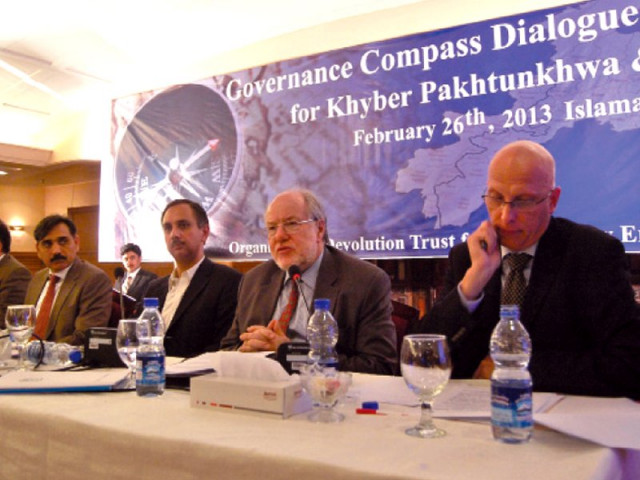(Mis)use of resources in K-P, Fata: After spending Rs18 billion, still no development in sight
Experts cite lack of coordination among state, donors as the main reason.

Panelists at the governance compass dialogue in Islamabad on Tuesday. PHOTO: EXPRESS
There is need of coordination, understanding and trust among donors, government and citizens to implement better development programmes in Federally Administered Tribal Areas (Fata) and Khyber-Pakhtunkhwa (K-P).
This was the unanimous stance of the panelists at a conference titled “Coordination between Government and Implementation Partners”, on governance in K-P and Fata, here at a local hotel on Tuesday.
“Lack of coordination from top to bottom is one of the biggest reasons that we cannot see any change in these areas,” said Planning Commission Deputy Chairman Nadeemul Haq, while speaking at the first session. “Ostensibly, there is a fragmentation between the government and donors from within and outside,” he said.
The incumbent government has spent Rs18 billion in Fata but there is no any apparent development at large, he said. “The need is to sit down with all stakeholders and dialogue to come on the same page,” Haq said.
Fakhr-e-Alam, Commissioner Malakand Division, shared his field experience regarding various issues being faced by donor companies like seeking no objection certificate, coordination with local administration and gaining confidence among local elders. “Everything is shrouded in mystery and nothing is ever clear to anybody, nevertheless the only solution lies in the transparent manner and taking all stakeholders including military into confidence,” he said.

K-P former Chief Secretary Khalid Aziz said that there were impediments and distortions in the system creating hindrance in the smooth flow of services to the common man of the area. “The people of these areas think that there is a centrist narrative which is not allowing there due shares of basic rights,” he said.
Akhtar Hayat Gandapur, Deputy Inspector General of Police, Malakand division, shared police perspective and underlined the feedback mechanism among the government, donors and other agents in the area.
The second session was about issues was related to embedding and sustainability. The panelists discussed effective embedding of government-donor programmes and reforms in government’s plans and priorities related to process, procedures, rules and laws.
UNDP Assistant Country Director Azhar Saeed Malik talked about aid effectiveness following strong binding between the state and non-state actors in development.
“But government and donors have to be accountable to make things clear,” he said.
Asia Foundation Country Representative Gareth Aicken shared the example of construction of small dams and government-donors glitch about the priorities and interests. “To keep away from such hindrances, the need is to think of the goals from the start instead of at the eleventh hour,” he said. The government needs to own and take charge of what kind of development it wants, he added.
Brigadier (retd) Haider Ali, Sector Commander, North FC Corps, talked of the big disconnect about state priorities and ground realities. “We helped state deradicalise the youth of Bajur but next there isn’t any option or way forward because the government has no plans to engage them in healthy activities,” he said.
Published in The Express Tribune, February 27th, 2013.













COMMENTS
Comments are moderated and generally will be posted if they are on-topic and not abusive.
For more information, please see our Comments FAQ